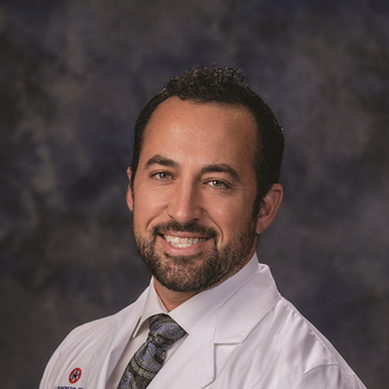Leading with Skill, Science and Compassion

“When I got there, my blood pressure was through the roof,” recalls Karaly, who learned that the chest pain he was experiencing signaled a heart attack.
A series of diagnostic imaging tests, including an electrocardiogram (ECG) and echocardiogram,
revealed three blocked arteries that would require a triple bypass operation. Karaly was in a state of “disbelief” at the prospect of open-heart surgery, but Eisenhower Board Certified Cardiothoracic Surgeon Daniel Logsdon, MD, put him quickly at ease.
“I was telling Dr. Logsdon that I wasn’t sure I wanted to go through with the procedure because it was so sudden. But after talking about it, I felt confident with him,” says Karaly, who recalls experiencing anxiety prior to the procedure, but afterwards, had high praise for the entire surgical team.
“The pre- and post-operative, and ICU staff, were phenomenal,” he adds. “I don’t have the words to express my appreciation for the compassion they have.”

During surgery, Dr. Logsdon employed femoral artery catheterization to insert an Impella® 5.5 Heart Pump, ensuring stable heart function throughout the operation. The world’s smallest heart pump, the Impella device provides support to certain patients undergoing coronary and vascular interventions.
“In George’s case, when we were ready to take him off the bypass machine, I wasn’t happy with how his blood was pumping — his heart was stressed and the blood wasn’t circulating properly,” Dr. Logsdon explains. “We placed the Impella pump to allow his heart to recover, removing it 24 hours later at his bedside.”
“Using a ventricular assist device like the Impella pump, we are not only able to treat patients with more severe coronary artery disease and get them through it successfully, we are also able to treat patients diagnosed with heart failure and help them through the recovery process,” Dr. Logsdon says. “It’s lifesaving.”
A new life
The triple bypass went smoothly and Karaly spent a week recovering in the hospital before being discharged home. A favorite anecdote of his post-operative experience: his ICU nurse who began singing and dancing to a Donna Summer tune on her smart phone while accompanying him for a walk around the ward.
“It was fantastic,” he recalls. “It really helped me get back to a sense of normalcy and feel like a human being again after what started as a near-death experience.”
Three months after surgery, Karaly began participating in Eisenhower’s Cardiac Rehabilitation Program. Located in the Renker Wellness Center on Eisenhower’s main campus, the program, which requires a cardiologist’s referral for patient participation, consists of individualized exercise sessions and educational classes with topics ranging from healthy nutrition and medication management to stress reduction and exercise fundamentals.
“The Renker Wellness Center was also a pivotal part of my healing,” he says. “From pre-op to rehab, all the teams work very well together, and I think that’s what makes the recovery process at Eisenhower so successful.”
Today, Karaly maintains a robust fitness regimen that includes walking on a treadmill and around his neighborhood, as well as strength training three times a week. He’s made changes to his eating habits, shifting to a mostly plant-based diet with vegetables, whole grains, and fish on occasion. He credits his wife of 46 years, Jeannie, and his children, for their unwavering care and support throughout surgery and recuperation.
“Aortic surgeries are our specialty, our atrial fibrillation program is rapidly expanding and we have been identified as one of the nation’s 50 Top Cardiovascular Hospitals,” says Dr. Logsdon. “Eisenhower’s commitment to integrating advanced technology reinforces the hospital’s ability to serve patients like George.”
“I’m so grateful for Dr. Logsdon — both his persistence and dedication to me as a patient,” says Karaly. “I probably would not be here if it weren’t for him.”
“The Coachella Valley is very fortunate to have a facility like Eisenhower and the people who work there,” he adds.
For more information or to contact Eisenhower Cardiothoracic Surgery Clinic, call 760.568.4330, or visit EisenhowerHealth.org/services/Cardiology.



